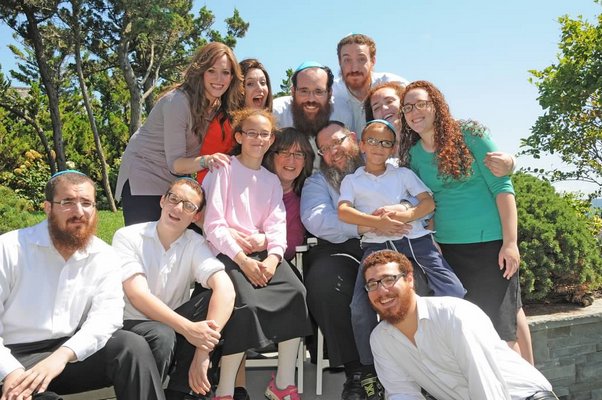
Two gray-shingled houses, sheltered by overflowing greenery and set back from Woods Lane in East Hampton, seem indistinguishable from countless other residences in the neighborhood: lots of land, a stone driveway and an indigenous Hamptons design. Yet these two particular domains are different from their neighbors. They both house an international movement helping “to ensure Jewish continuity by fostering awareness, knowledge and practice.”
Representing the Chabad Lubavitch of the Hamptons, these dwellings are like more than 2,700 other institutions worldwide, including in such far-flung places as Thailand and The Congo, where 4,000 emissary families reside. Chabad Lubavitch is a branch of Orthodox Judaism that follows Jewish law—the Torah—going back to Moses and has been passed down from generation to generation. While modern life changes, adherence to the law has remained the same, unlike in Conservative and Reform Judasim, where the law may be changed to reflect alterations in cultural mores. According to Orthodox law, for example, Jews cannot switch on their electricity on the Sabbath, although they can use an automatic timer to do so.
It’s difficult for a visitor to know what to expect when approaching the main house of Chabad Lubavitch, which is the home of Rabbi Leibel and Goldie Baumgarten and, these days, two of their 12 children—except, that is, a focus on tradition.
Yet a tricycle sitting outside the front door and play equipment spread out in the backyard signal a more modern lifestyle. That impression is reinforced when Ms. Baumgarten, a youthful, cheerful woman, appears at the door with a warm welcome. Straight ahead, a dining room with a huge table can be seen; remnants of a Bible study art project by her 9-year-old son, Chaikel, cover the table. A big kitchen and a smaller office are situated to the right.
Upstairs, the couple’s 10-year-old daughter, Esty, works on the computer. Both children study online facilitated by a Jewish day school up-island; thus they do not have to commute. Other siblings attended Jewish schools in Brooklyn, staying with their grandparents during the week and coming home for the Sabbath on Friday nights.
Scattered throughout the residence are seven bedrooms which accommodated the children through the years. One feels immediately at home.
Ms. Baumgarten’s cellphone rings, Chaikel wanders over to ask his mother a question, a workman saunters into the dining room. She follows him outside and watches as he takes measurements for an awning for the mikvah, a bath used in Judaism for ritual immersion.
While Ms. Baumgarten’s daily routine is not exactly like those of other wives and mothers—after all, she is also co-director, along with her husband, of the Chabad Lubavitch of the Hamptons, which means coordinating any number of activities as well as maintaining the buildings—it’s easy to feel a kinship with her.
As Chabad Lubavitch’s co-director, “she is the glue that holds everything together,” her husband, Rabbi Leibel, notes. One can see why he makes this observation.
Asked about the adjustments that the family has had to go through over the years, Ms. Baumgarten replied, ”It didn’t matter about making adjustments, like finding new friends. We’re here on a mission to serve the goals of Chabad Lubavitch.”
“The kids felt that way as well,” she said.
Things are a bit easier now that only two children live with their parents, and now that the family has a permanent residence. There was a time when the rabbi was going back and forth up-island to conduct services on the weekends and during the summer, and Ms. Baumgarten and the family accompanied him.
That changed when the East Hampton congregation wanted the rabbi’s full-time presence and bought him and the family the Woods Lane home. When the house next door went on the market, it, too, was purchased and turned into a synagogue and community center.
Meanwhile, the first structure was torn down and redone. Realizing that making meals for their large family and for congregants would be a priority, Mrs. Baumgarten remembers giving the builders one instruction: “Make me a big dining room and kitchen.”
Both rooms have certainly come in handy during the 10 years the family has lived there. The long table is the site of Sabbath and holiday dinners for family and congregants alike. It was certainly in high gear earlier this month as the rabbi celebrated his birthday with balloons, conversation, prayers and songs. It’s a good thing the table can seat 50 to 80 people, according to Ms. Baumgarten, considering how many individuals she cooks for, often with help from her children.
Her directions to guests is simple: “Sit down and don’t move.”
The original second house next door has more than served its purpose as well. There, religious services take place—men and women sit separately from each other—along with special programs and study groups. For example, there is daily Torah study, perhaps a meeting of the book club or an apple pie bake-off. The Torah and Tea group meets weekly around a large table where discussions about Jewish traditions and law take place. Provocative views are also shared, including about current political issues. In the summer, there are special activities, like children’s cooking classes and backyard barbecues.
In this same backyard, there’s the mikvah. Artworks, including tapestry and a large ceramic vase, abound, and beautiful tiles cover the floor. The small pool is also a serene work of art.
Asked about her role in Judaism as a wife, mother and co-director, Ms. Baumgarten put it all in perspective, expressing a connection between traditional and contemporary life. “Husbands and wives each have a role; one is not better than the other, just different,” she said. “Women were created to feel just as important. They are the stronghold, the pillar.”
In the meantime, the long table will continue to play an important role in the Chabad Lubavitch community. It, too, is a stronghold and a pillar.